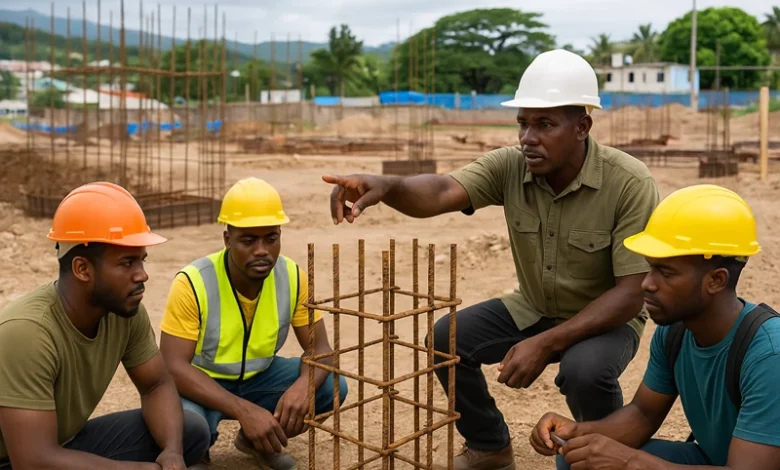Building Regulations 2022

In March 2022, the Government of Dominica introduced the Building Regulations 2022, a comprehensive framework designed to enhance construction standards, ensure safety, and promote sustainable development throughout the island. These regulations serve as a critical tool for the Physical Planning Division, enabling a thorough examination of development proposals to ensure alignment with the nation’s physical, social, and economic environment.
Legislative Framework
The Building Regulations 2022 were established under the authority of the Physical Planning Act, specifically Chapter 63:05, which empowers the Minister to enact regulations about physical development and construction practices. These regulations incorporate the Building Code, which sets out detailed standards for the design, construction, and maintenance of buildings within Dominica.
Structure and Content of the Building Code
The Building Code, as outlined in the Building Regulations 2022, is organized into several key sections, each addressing specific aspects of construction and development:
- Administration of the Code: Defines the roles and responsibilities of stakeholders, including builders, owners, and regulatory authorities.
- Definitions: Provides clear explanations of terms used within the code to ensure consistent understanding.
- General Requirements: Outlines fundamental principles and standards applicable to all construction projects.
- Materials and Construction Standards: Specifies acceptable materials and construction methods to ensure structural integrity and safety.
- Public Health, Environment, Energy, and Safety: Establishes protocols to promote public health, environmental protection, energy efficiency, and safety measures in building design and construction.
- Precautions During Building Construction: Details safety measures and precautions to be taken during the construction process to protect workers and the public.
- Water Supply Services: Provides guidelines for the provision and management of water supply systems within buildings.
- Sewage and Waste Water Disposal: Outlines requirements for the proper disposal of sewage and wastewater to protect public health and the environment.
- Plumbing: Sets standards for plumbing systems to ensure functionality and safety.
- Solid Waste Disposal: Provides guidelines for the management and disposal of solid waste generated by buildings.
- Electrical and Mechanical Installations: Specifies standards for electrical and mechanical systems to ensure safety and efficiency.
- Loads: Defines the load requirements that structures must be designed to withstand, including considerations for natural hazards.
- Excavation and Foundations: Provides guidelines for excavation work and the construction of foundations to ensure stability and safety.
- Timber Construction: Outlines standards and best practices for constructing buildings using timber.
- Concrete Block Masonry: Sets standards for the use of concrete blocks in masonry construction.
- Plain and Reinforced Concrete: Provides guidelines for the use of plain and reinforced concrete in building construction.
- Structural Steel: Specifies standards for the use of structural steel in construction projects.
- Small Buildings: Offers simplified guidelines tailored for the construction of smaller structures, such as private dwellings and small retail shops.
These sections collectively ensure that construction practices adhere to safety, durability, and environmental sustainability standards.
Implementation and Compliance
The Physical Planning Division is responsible for the implementation and enforcement of the Building Regulations 2022. This includes reviewing development proposals, issuing permits, and conducting inspections to ensure compliance with the established standards. The regulations apply to all forms of development, encompassing new constructions, renovations, and demolitions.
To support effective compliance, a comprehensive training program has been developed for building professionals and government stakeholders. This initiative aims to enhance understanding and application of the building codes, improve communication regarding the benefits of compliance, and conduct public outreach to promote adherence. The training program serves as a model for other CARICOM countries seeking to strengthen their building code compliance mechanisms.
Significance and Impact
The adoption of the Building Regulations 2022 marks a significant step forward in Dominica’s efforts to enhance the resilience and sustainability of its built environment. By establishing clear and comprehensive standards, the regulations aim to:
- Ensure Structural Integrity: Mandating the use of approved materials and construction methods to withstand environmental stresses.
- Promote Public Health and Safety: Implementing measures that protect occupants and the broader community.
- Encourage Sustainable Practices: Integrating considerations for environmental protection and energy efficiency into building design and construction.
These regulations are expected to contribute significantly to the nation’s economic development by reducing the risks associated with natural disasters and improving the quality and safety of the built environment.
Strategic Outlook
The Building Regulations 2022 provide a robust framework for guiding construction and development activities in Dominica. Through detailed standards and a structured approach to compliance and enforcement, these regulations aim to foster a safer, more resilient, and sustainable built environment for all Dominicans.




